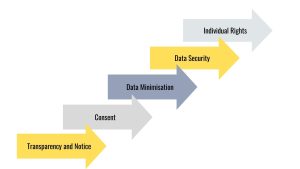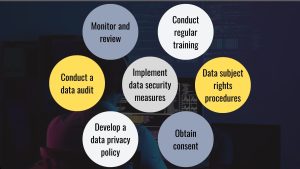Data Privacy Regulations: Guide for Businesses
Introduction In today’s digital age, data privacy has become a critical issue for both businesses and consumers. With the rise of data breaches and growing public awareness of...

Introduction
In today’s digital age, data privacy has become a critical issue for both businesses and consumers. With the rise of data breaches and growing public awareness of the importance of personal information security, governments around the world have imposed strict data privacy regulations. Navigating these regulations can be difficult, but it is important for businesses to understand and comply with them to avoid large fines and maintain consumer trust. This article aims to provide companies with a comprehensive guide on how to navigate data privacy regulations in software development.
Understanding Data Privacy Regulations
Data privacy regulations are laws and guidelines designed to protect personal information from misuse, unauthorised access, and breaches. These regulations vary by country and region, but generally have common principles such as transparency, consent, data minimisation, and security. Some of the most well-known data privacy regulations include:
- General Data Protection Regulation (GDPR): Adopted by the European Union in 2018, the GDPR is one of the most comprehensive data privacy regulations. It applies to any business that processes the personal data of EU residents, regardless of where the business is located. The GDPR emphasises user consent, data protection, and the right to access and delete personal information.
- California Consumer Privacy Act (CCPA): Effective since 2020, the CCPA is a state-level regulation in the United States that provides California residents with new rights regarding their personal information. It includes provisions for data access, deletion, and opt-out of the sale of data.
- Personal Data Protection Act (PDPA): The PDPA, enacted in Singapore, regulates the collection, use, and disclosure of personal data by organisations. It aims to balance the need to protect data with the need for organisations to collect and use data for legitimate purposes.
- Brazilian General Data Protection Act (LGPD): Inspired by the GDPR, the LGPD is Brazil’s data protection regulation that provides the legal basis for the use of personal data. It includes provisions on data subject rights, data protection principles, and the establishment of a national data protection authority.
Key Principles of Data Privacy Regulations
Despite the variations in data privacy regulations across different jurisdictions, there are several key principles that businesses should be aware of.

- Transparency and Notice: Businesses must be transparent about their data collection practices and provide clear notices to individuals about how their data will be used. This includes informing individuals about the types of data collected, the purposes for data processing, and any third parties with whom the data may be shared.
- Consent: Obtaining explicit consent from individuals before collecting and processing their personal data is a cornerstone of many data privacy regulations. Businesses must ensure that consent is informed, specific, and freely given. Additionally, individuals should have the ability to withdraw their consent at any time.
- Data Minimisation: Data minimisation requires businesses to collect only the data that is necessary for the specific purpose for which it is being processed. This principle helps reduce the risk of data breaches and ensures that businesses are not collecting excessive or irrelevant information.
- Data Security: Protecting personal data from unauthorised access, disclosure, alteration, and destruction is a fundamental requirement of data privacy regulations. Businesses must implement appropriate technical and organisational measures to safeguard data, such as encryption, access controls, and regular security assessments.
- Individual Rights: Many data privacy regulations grant individuals certain rights over their personal data, including the right to access, correct, delete, and port their data. Businesses must have processes in place to respond to these requests in a timely and efficient manner.
Steps to Comply with Data Privacy Regulations
Achieving compliance with data privacy regulations can be challenging, but following a systematic approach can help companies navigate the complexities. Here are some key steps to consider.

- Conduct a data audit: Start by conducting a thorough audit of the personal data your company collects, processes, and stores. Identify the types of data, the purposes for which it is processed, and the sources of the data. This audit will help you understand the data landscape and identify any potential compliance gaps.
- Develop a data privacy policy: Create a comprehensive data privacy policy that sets out your data practices, including how you collect, use, store, and share your data. Make sure your policy is easily accessible to people and written in clear, simple language.
- Obtain consent: Put in place mechanisms to obtain explicit consent from people before collecting their personal data. This could include consent forms, checkboxes, or pop-up notifications. Keep a record of consent to demonstrate compliance.
- Implement data security measures: Invest in robust data security measures to protect personal data from breaches and unauthorised access. This may include encryption, firewalls, intrusion detection systems, and regular security audits.
- Establish data subject rights procedures: Develop procedures for handling data subject requests, such as access, correction, deletion, and portability requests. Train your employees on these procedures and ensure requests are processed within the required timeframes.
- Conduct regular training: Educate your employees on data privacy regulations and the importance of data protection. Regular training sessions can help ensure that everyone in your organisation understands their responsibilities and follows best practices.
- Monitor and review: Continuously monitor your data privacy regulations and review them regularly to ensure ongoing compliance. Stay informed of any changes to data privacy regulations and update your policies and procedures accordingly.
Conclusion
Navigating data privacy regulations is an ongoing challenge for businesses, but it is essential to build consumer trust and avoid legal repercussions. By understanding the basic principles of data privacy regulations and taking proactive steps to comply, businesses can protect personal data and demonstrate their commitment to data privacy. Remember, data privacy is not just a legal requirement; it is an essential component of a responsible and ethical business strategy.